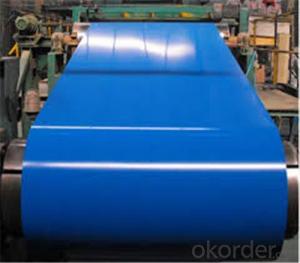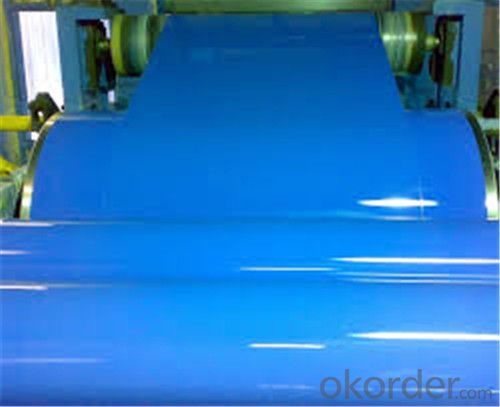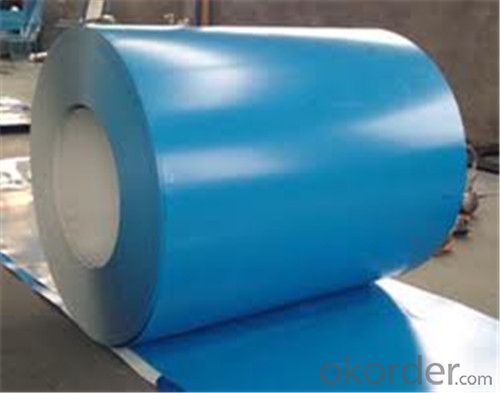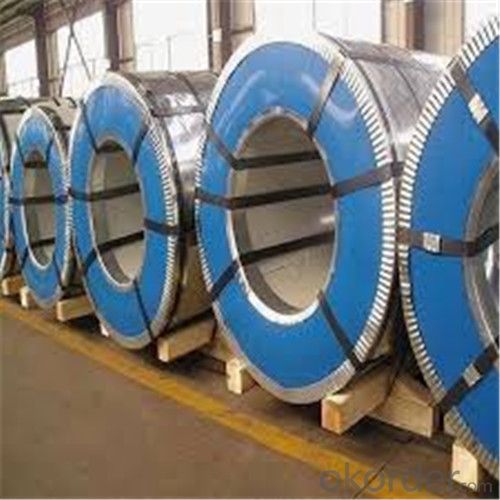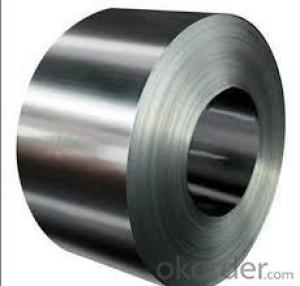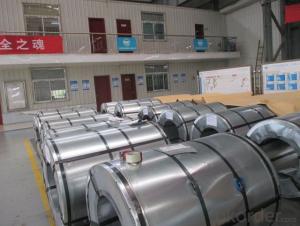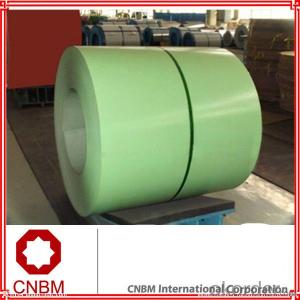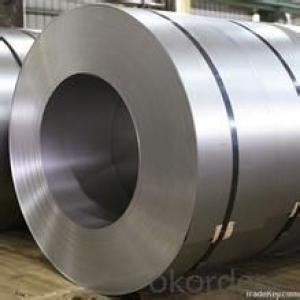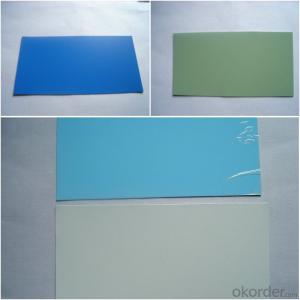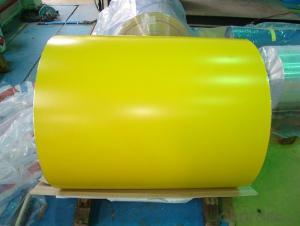Color coated Galvanized cold Rolled Steel coil
- Loading Port:
- Tianjin
- Payment Terms:
- TT OR LC
- Min Order Qty:
- 25 m.t.
- Supply Capability:
- 300 m.t./month
OKorder Service Pledge
OKorder Financial Service
You Might Also Like
Advantages of Our Prepainted Galvanized SteelCoil
1.Excellent corrosion resistance: The zinc layer provides a good protection of Pre-painted Galvanizeed Steel Sheet.
2.High heat resistance: The reflective surface of the material aids in efficiently reflecting the sunlight away and in turnreducing the amount of heat transmitted.
The thermal reflectivity converts into energy savings.
3.Aesthetics: Pre-Painted Galvanized steel sheet is available in plethora of patterns and multiple sizes as per the requirements that given by our customers.
4.Versatility: can be used in the various areas.
Applications of Prepainted Galvanized SteelCoil
1.Buildings and constructions: roofing, ceilings, gutters, venting lines, indoor decorations, window frames, etc.
2.Electrical appliances: computer shells, washing machines, refrigerators, dehumidifiers, video recorders, water heaters, etc.
3.Agricultural equipments: troughs, feeding tools, agricultural driers, irrigation channels, etc.
4.Vehicle parts: back-seat plates of buses and trucks, conveying systems, oil tanks, etc.
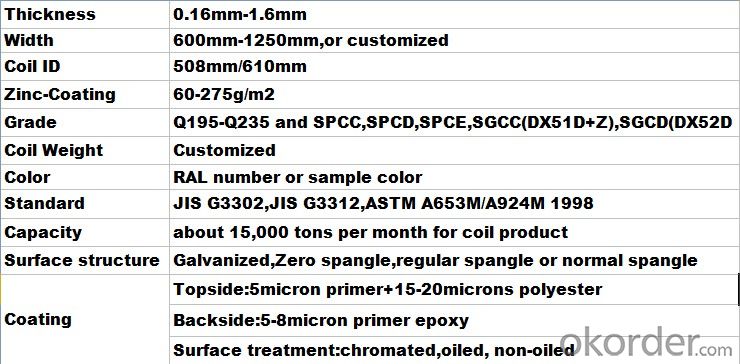
- Q: How are steel coils used in the production of steel rings?
- Steel coils are used in the production of steel rings by being fed through a machine that cuts and shapes the coil into individual rings. These rings can then be further processed and manipulated to create a wide range of steel products, such as bearings, pipe fittings, or automotive components.
- Q: i am working in a firm that deals with steels.. so it is necessary for me to understand the chemistry of the steels from their names so that i need not memorize all the grades with their metallury.. where can i find information about this nomenclature ? please help
- For steels with a four number code like 1020, 4140 ect the first two digits are the alloying information. I think you need to memorise those. 10 steels are plain carbon steel with no alloying. 41 steels are chrome-molly. The third and forth digits are the carbon content. 1020 is 0.2% Carbon, 4140 is 0.4% carbon. I don't know if there is a system to stainless steels.
- Q: I want to purchase steel for construction purpose, What aspects should I keep in mind while deciding that which company should I contact for this?
- It has been a few years since I was in the business but I have found that some steel from some countries can be quite different from the standards steel made in the US. For instance, one in 5 of my Indian made cast iron fittings would break when tightening it down. This never happened with US fittings. Even though I could take it back and get a refund, the increased price of US made materials was worth the savings in time and trouble. On a job in Columbia, the 3 inch angle iron came to us in 4 different sizes, all around three inches but not quite. This is not to say that all foreign metal is bad. One RD project I headed up we found a foreign bearing steel to be far superior to anything we could get in the states.
- Q: Eutectoid Steel
- Eutectic steel is used to produce pearlite, bainite, spheroidite and martensite steels. Those steels vary in strength, hardness and ductility. One uses martensite steel for example in razor blade manufacturing. Of course there is no end to the various uses of these steels.
- Q: How are steel coils used in the manufacturing of electrical wiring?
- Steel coils are not typically used directly in the manufacturing of electrical wiring. However, steel coils can be used in the production of wire drawing machines, which are used to stretch and shape the copper or aluminum wire used in electrical wiring.
- Q: I want to make a lap steel guitar in my wood tech class. can anyone give me a link to a video or site that has steps on how to build one.
- Steel guitars have cables attached to foot pedals to change the sound. I don't know how this would work with the top resting on your lap.
- Q: It seems that steel would be stonger and more stable than wood, fire resistant, and better for the environment, so why are most homes wood-framed rather than steel-framed?
- In most locations a 2x4 is slightly cheaper than a steel stud. The labor is cheaper with wood because it's less skilled and there are many people to swing a hammer cheaply. Most contractors do what they know and most only know wood.
- Q: How do steel coils contribute to strength and durability in manufacturing?
- Strength and durability in manufacturing are enhanced by steel coils in several ways. Firstly, steel possesses inherent strength due to its high tensile strength, enabling it to bear heavy loads and resist deformation. Coiling steel involves hot rolling or cold rolling, which further enhances its strength and durability. During hot rolling, steel is heated to high temperatures and passed through rollers to shape it into a coil. This process aligns the steel's grain structure, resulting in a more uniform material with reduced internal stresses. Consequently, it becomes stronger and more resilient, maintaining its structural integrity even during manufacturing processes like bending, stamping, and forming. In contrast, cold rolling involves passing steel through rollers at room temperature. This process not only increases strength and hardness but also improves the surface finish. Cold-rolled steel coils are known for their smooth and uniform appearance, making them ideal for applications where aesthetics are crucial. Moreover, steel coils can be coated with various protective layers to enhance durability. Coatings like zinc or polymer-based ones act as barriers against corrosion, moisture, and other environmental factors that can weaken the steel. By preventing rust and degradation, these coatings prolong the lifespan of steel coils and the products they are used in, making them more durable and cost-effective in the long term. In summary, steel coils contribute to strength and durability in manufacturing by providing a resilient material capable of withstanding heavy loads and resisting deformation. The hot rolling and cold rolling processes further enhance the steel's strength and uniformity, while protective coatings prevent corrosion and extend the coils' lifespan. Ultimately, steel coils are indispensable components in manufacturing, enhancing the strength and durability of a broad range of products.
- Q: What are the common thickness tolerances for steel coils?
- The common thickness tolerances for steel coils usually range from +/- 0.001 to +/- 0.005 inches, depending on the specific industry standards and customer requirements.
- Q: What are the common coil processing equipment used in the industry?
- Some common coil processing equipment used in the industry include coil slitters, coil flatteners, coil feeders, and coil recoilers. These machines are essential for processing metal coils into various shapes and sizes, allowing for efficient production and manufacturing processes.
Send your message to us
Color coated Galvanized cold Rolled Steel coil
- Loading Port:
- Tianjin
- Payment Terms:
- TT OR LC
- Min Order Qty:
- 25 m.t.
- Supply Capability:
- 300 m.t./month
OKorder Service Pledge
OKorder Financial Service
Similar products
Hot products
Hot Searches
Related keywords
